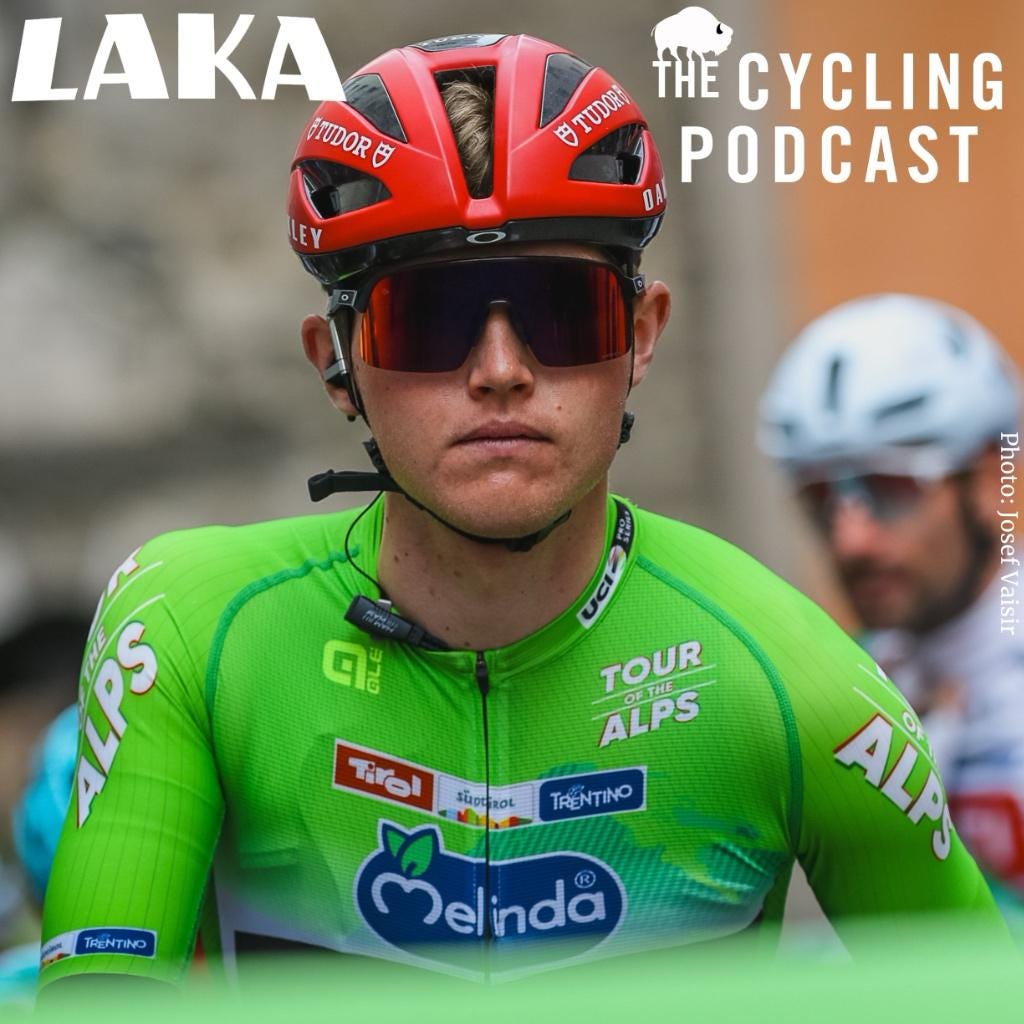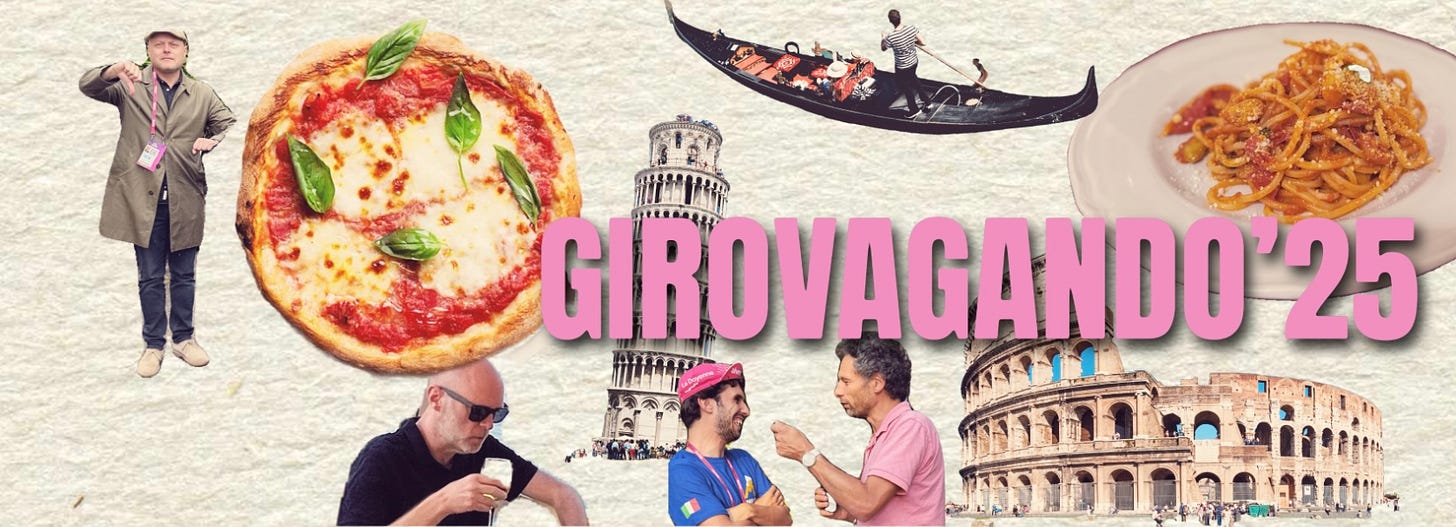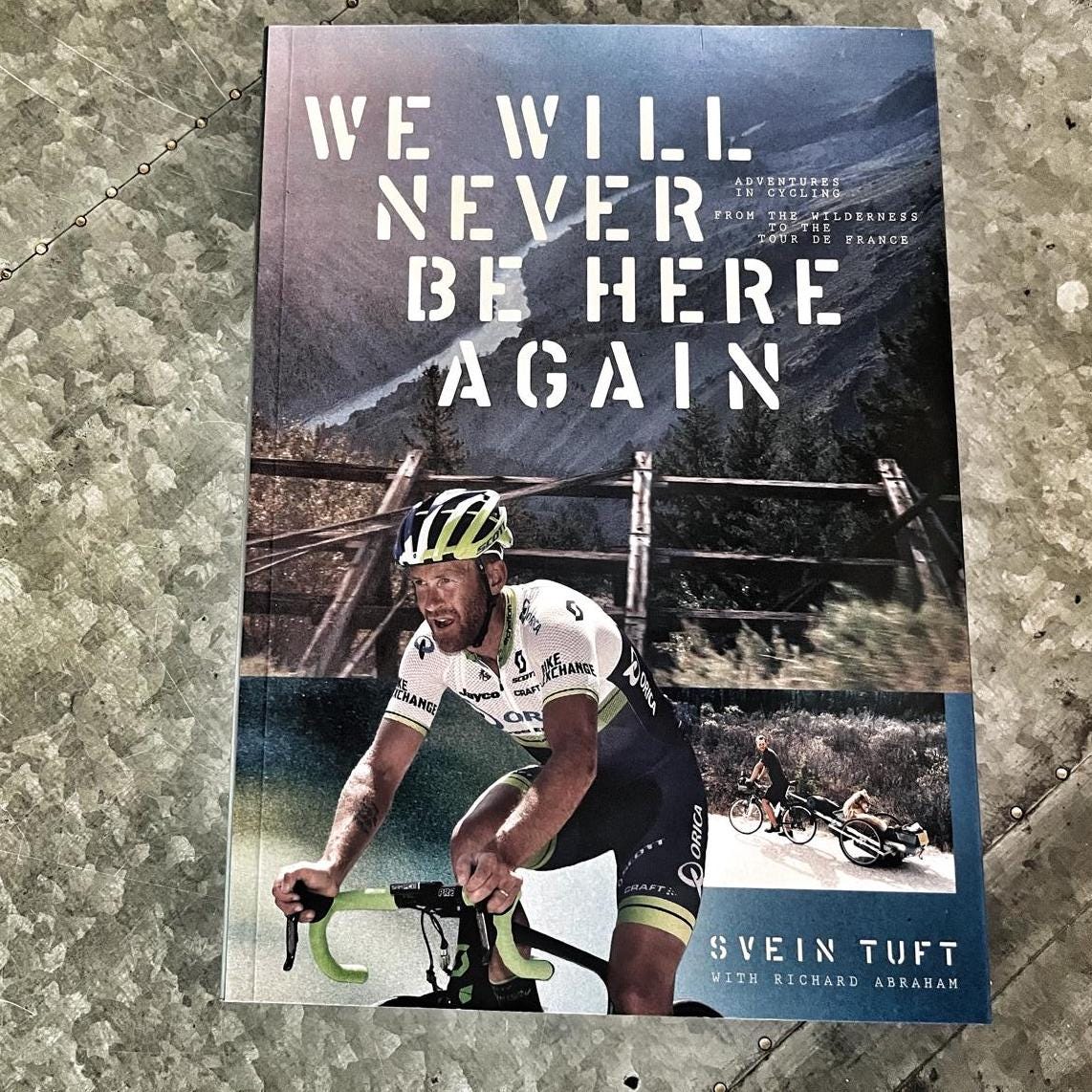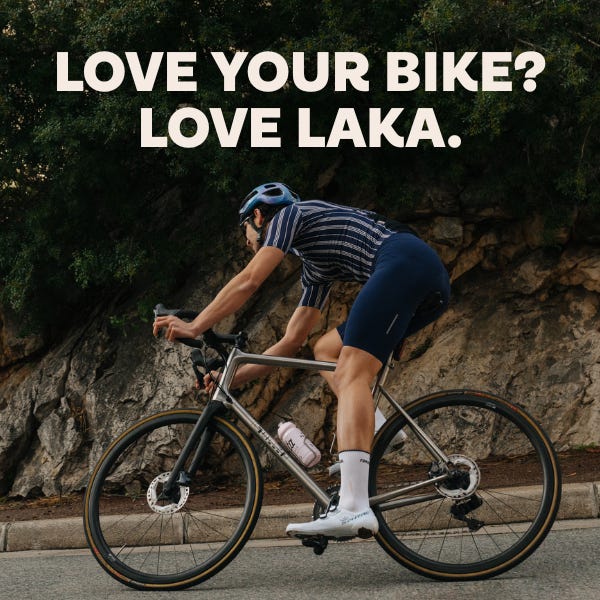by Lionel Birnie
It would be understandable if, by the end of Sunday’s Liège-Bastogne-Liège, you were suffering from a phenomenon known as Pog Fatigue. The Slovenian world champion has done a Merckx during this spring campaign with an extraordinary run of results. He finished on the podium in each of the seven Classics he rode spanning the dusty, gravel roads of Tuscany, the cobbles of Flanders and northern France, and the short, steep hills of the Ardennes.
As Daniel said in our episode of Arrivée recorded shortly after Tadej Pogačar won La Doyenne for the third time on Sunday, there has at least been some nuance to his domination. The rivalry with Mathieu van der Poel was gripping. Seeing two such different yet evenly-matched riders going toe-to-toe on the Poggio, the Paterberg and the Arenberg was once-in-a-generation stuff.
Then there was the return of Remco Evenepoel, whose gold bike, gold helmet and gold glasses gave the impression of a man who’d arrived at the fancy dress hire shop to find the best costume had been taken – Pog’s rainbows – but he was able to choose an outfit to make quite an impression at the party nevertheless.
A brief glimpse of frailty, if we can even call it that, at the Amstel Gold Race hinted that perhaps even Pogačar was feeling Pog Fatigue towards the end of April. But his seated accelerations on the Mur de Huy and La Redoute to clinch the two Ardennes races were so spectacular it brought Hugo Coorevits’ description of Supersonic Aircrafts roaring back to the front of our minds.
Now the racing season changes gear, perhaps with all the grace and subtlety of a dropped chain while trying to shift from the big ring to the small one, but it’s a welcome refresh. Pog will vanish from view for a month or so and other rivalries and stories will have space to breathe. The Giro d’Italia is almost upon us, with an intriguing opening weekend in Albania followed by a route which seems to me to be a greatest hits mixtape of the past half-dozen editions.
In this week’s episode it was great to be joined by Larry Warbasse of Tudor Pro Cycling for an inside account of how they helped Michael Storer pull off a Pog-esque move to clinch the Tour of the Alps. It was a day that exemplified great teamwork, with Decathlon-AG2R’s Nicolas Prodhomme and 18-year-old prodigy Paul Seixas breaking away to decide the final stage between them, while Tudor enacted a similarly impressive formation move in the race for GC behind them.
The Tour of Alps, with its beautiful scenery and five consecutive days of GC-style racing, is always a great trailer for the final week of the Giro, even if Daniel tires of me asking when they’re going to reach the Dolomites…
By the end of this week’s episode Daniel and I had more or less installed the Australian Storer as joint-favourite for the Giro, which may have been a take overly influenced by recency bias but he’s certainly ridden himself onto the radar and will be on the second row of the grid when it comes to assessing the most likely contenders for the maglia rosa. Who will win? Well, it’s quite nice to be a week or so out from the start of a grand tour without a clear idea. Roglič has won a grand tour in five of the last six seasons and will be strong but he’s 35 now, which is definitely in the third week of a GC rider’s career span. (It would also make him the oldest Giro winner in history). It’ll be a Pogless Giro but the prospect is all the more intriguing for that, especially considering UAE-Team Emirates’ strength in depth in his absence. We’ll get into the details of all this in our usual pre-race preview next week and the opening few episodes once we get to Albania.
Girovagando ’25
Our daily Giro d’Italia coverage kicks off next week during the final countdown to the grande partenza in Albania on Friday, May 9. There’ll be our preview episode, KM0 and a few other things to read and listen to before the opening stage gets the first grand tour of the season underway. Daniel will be joined by Lionel in Albania and for the first few stages on Italian soil, before Brian Nygaard returns to the mic for the middle week. We will welcome new signing Michele Pelacci to see the race through to Rome, or more likely, given the length of the transfer, almost Rome.
The 2025 Giro will be the tenth we’ve covered with daily episodes recorded on the road. Who was with us back in May 2016 when Tom Dumoulin and Marcel Kittel dominated the opening weekend in the Netherlands, Richard bumped the Maserati into a succession of flowerpots, Primož Roglič won his first grand tour stage in the Chianti wine trial, a young Giulio Ciccone took his first Giro stage in Sestola, Steven Kruijswijk crashed into an ice wall, dashing his overall chances, and Vincenzo Nibali won his fourth and final grand tour?
• Daily coverage of the Giro starts on Friday, May 9. Follow The Cycling Podcast in your preferred app to make sure you don’t miss an episode.
We Will Never Be Here Again
by Richard Abraham
The other day I listened to an episode my old Tour travel companion Mitch Docker recorded back when Life in the Peloton was hosted by The Cycling Podcast. I had already heard it at least three times before but the sun was out and I stuck one headphone into an ear and giggled along as I pedalled my bike through the lanes.
The episode is a 2020 recap of the Orica-GreenEdge team time trial win at the 2014 Giro d’Italia. It’s brilliant. One of Mitch’s best episodes, and I know Lionel agrees. The episode begins with riders trying to define the Giro d’Italia. Their answers: beauty, passion, fans, culture, authenticity, difference, cycling right down to its core.
All true, but one answer, Cam Meyer’s, lingered in my head. ‘Everyone says you come home [from the Giro] with the most stories of any race in the calendar, there’s something that’s gone on and there’s something epic to talk about.’
If I had to define what the Giro was about from my perspective, that’s what I’d go for. It has always felt to me like the race with an extraordinarily rich narrative. Think of all the sections of your local bookshop – travel, history, romance, fantasy, science- fiction, esoteric – and they’re present in a Giro. (Maybe a more accurate image is one of those second-hand bookshops where everything is jumbled around in cartons on rickety shelves). That’s the Giro. A storytelling goldmine.
What that episode does so well is tell the particular story of the first day of that race. It was a stage that put Orica-GreenEdge onto the winners’ podium and their rider Svein Tuft into the pink jersey, though if you listen to Mitch’s interviews with the protagonists from that day in Belfast there’s a lot more to it than that. There are nerves, self-doubt, weather, potholes, and Pieter Weening, a maverick Dutchman in a team full of rouleurs who almost derailed their success on the main climb of the course.
‘If you go up that climb and you stop halfway and drink a cup of tea or something, yeah OK, if you wanna do racing like that OK, that’s also nice, but then you never win races, eh? Haha. So yeah no it was all necessary,’ is what Weening has to say about it.
Let’s pause for a second to remember that this is the story of just one team in that race on just one day. In total there were 21 stages and 22 teams, though not all 198 riders would be natural raconteurs like the GreenEdge crew. You’ll have to listen to the episode to find out how it came together.
The first three occasions I listened to that episode were when I was helping Svein Tuft write and publish his autobiography.
Here comes the plug: it’s called We Will Never Be Here Again and it’s out now. The Giro was always going to be an important component of the book. Svein only wore the pink jersey for one day but the maglia rosa was symbolic of his role on that team and his cycling career. The paperback back cover has him in the pink jersey and for the hardback version of the book we chose end papers dyed a Giro shade of pink (Pantone 1905 C). Svein being Svein, his preferred memento of the day is his SRM power file (620 watts for 90 seconds at the end of a 25-minute team time trial).
That 2014 Giro was such a rich vein of stories. In that edition alone there were broken bones, cheating, deluded organisers, snow, bullying, a mopey Italian champion and a visit to a cheese factory. As Svein says, it was organised chaos.
Even with 100,000 words (the book’s length) we had to leave some of those Giro tales on the cutting room floor (let’s just say Svein has lived a lot of adventures and there was an awful lot of material to cram in there).
In brief, one by one our GreenEdge heroes from stage one fall by the wayside to illness, injury or misfortune and by the final week there are two left: Svein and Michael Hepburn. Lead sports director Matt White’s team meetings are short and to the point: ‘Heppy, stay with Sveino. That’s it.’ The riders break the class divide and dine with the team staff. Each night it’s someone’s birthday (it’s not really but it encourages the Italian kitchen staff to bring wine and cake). Then in the final week they head over the Gavia and the Stelvio passes. It starts to snow.
‘Heppy and I aren’t that similar in how we think or what we’re into,’ Svein writes. ‘But to this day I can just look at him and give him a smile and he essentially knows what I’m thinking about. Finishing that race together gave us such a deep and powerful connection that we will both have for the rest of our lives.’
That’s another Giro story that we’ll have to leave for another time. For now we can look forward to the month of May knowing that there are plenty more where that came from.
• Svein Tuft’s autobiography, We Will Never Be Here Again, written with Richard Abraham, is available now.
When things go wrong, Laka have got your back
We would like to say a huge thank you to Laka for sponsoring The Cycling Podcast for the duration of the spring Classics. It would really show your support for the podcast if you chose to complete their survey, below. Laka have really had our backs over the past six weeks and their insurance will be there when you need it most.
Laka is shredding the rules of insurance by using a collective-driven insurance model to make insurance fair, not fixed. Instead of charging you a fixed premium, Laka simply split claims among the collective fairly at the end of each month, so you only pay for what’s needed.
Got a brand-new bike? Laka covers it at full value with no depreciation and zero excess, because when you invest in top-quality gear, you deserve top-quality protection. And if you ever need to make a claim, rest assured it’s handled in-house by cycling experts who are keen to get you back on the road as quickly as possible.
Why Choose Laka?
Fair: Laka only makes money when we settle claims. The cap is based on your risk profile and riding habits, not just your postcode. This ensures more accurate and fair pricing.
Flexible: Annual contracts are in the bin! You’re not tied in for a year's flat cover, switch between cover so you are only paying for what you need when you need it.
Community: We are cyclists first and insurance providers second. Our mission is to support the cycling community and get more people enjoying life on two wheels.
Collective: Your premiums go directly to helping fellow cyclists get back on their bikes. Your cover supports riders like you, creating a true collective-driven insurance model.
Laka is proud have sponsored The Cycling Podcast’s Spring Classics coverage, and listeners can get their first 30 days’ cover free with the code TCP30 at laka.co
Love your bike? Love Laka. T&Cs Apply.
Tell Laka what you think – and win £200 of Albion cycling gear
Take a few minutes to complete Laka’s short survey. As a thank you, you’ll be entered into a prize draw to win £200 of Albion cycling gear. Thanks for helping us shape the future of bike insurance.








Definitely feeling the Pog Fatigue—do you offer a 12-step program or should I just enroll directly at Attitude Camp, Lionel?
Re-listened to the pod.
Crazy how Bling is still in the mix at the front of the biggest races 11 years on